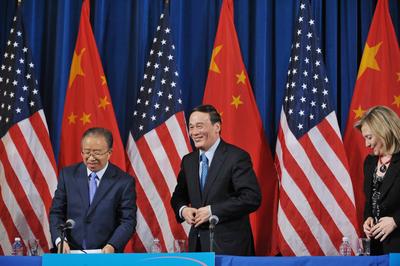China might reassess how it shapes its relations with highly repressive regimes, and it will have to take into account that Western countries are now better positioned to push resolutions aimed at intervening in certain types of countries through the UN Security Council (UNSC).
The uprisings run counter to assumptions that the predominant struggle in Middle Eastern politics is between US-backed authoritarian regimes and Islamic fundamentalism. Instead, the recent revolts involve a third force — the ‘urban underdogs.’ These popular movements are largely disorganised, have no leaders and are not based on clearly defined ideas. The uprisings are the outcome of poor economic conditions, the authoritarian suppression of fundamental liberties, and the highly corrupt nature of the ruling elite. Situational factors also play a role: the spill over effect from revolts in one country to the next; the availability of modern forms of communication to enable mobilisation; the use of symbolic places for mass gathering (in the case of Tahrir Square in Cairo); overwhelming attention from the West; and the policy inclinations of the US and European governments.
As the Arab world transforms, becoming more tumultuous along the way, Washington will face new dilemmas, and the fight against terror will no longer be overwhelmingly dominant. ‘Pushing democracy’ has returned as a major foreign policy theme in Washington as the uprisings partially restore the West’s self-confidence, battered from the financial crisis.
All of this has major implications for China’s foreign relations. Washington’s deeper involvement in the Middle East is favourable to Beijing, reducing Washington’s ability to place focused attention and pressure on China. But, conversely, the partial return of the push for democracy is not to the benefit of China or stable Sino–US relations. China may need to reconsider its quite amicable relationships with regimes that are repressive, corrupt and have little popular support. Beijing is insufficiently prepared to deal with dramatic political changes in such countries, clearly shown in the past when China’s relations with Iran (1979), Romania (1989) and Serbia (1999) were severely affected. This happened more recently in Zimbabwe, and now also in Egypt and Sudan. Other countries where similar developments could take place are Burma, North Korea and perhaps also Pakistan.
The Middle Eastern turmoil is also relevant to China’s domestic stability. Some activists in and outside China are hoping for a ‘Chinese jasmine revolution.’ Beijing overreacted somewhat, particularly in the early days, by taking strong domestic security precautions despite no signs of widespread activism in China. This may have been the activists’ immediate purpose: to embarrass the Chinese government and to show its lack of self-confidence to the world and the Chinese public. This in turn could make Beijing more hesitant about deepening economic and political reforms.
The uprisings are also affecting China’s international position with regard to the issue of intervention. Beijing probably believed they had no choice other than to allow the UNSC to adopt Resolution 1973, which gave the international community the authority to establish a no-fly zone over Libya. It was clear that the US, France and the UK were resolutely determined to launch a military strike, and certain Arab and African countries supported and even intended to join the intervention. Had Beijing vetoed the resolution, China’s relations with both the West and the Arab countries involved would have been severely strained — and the West would have still launched their attack anyway. This was a hard decision for China: Resolution 1973 could form a dangerous precedent in international law, as previous norms have been revised in favour of armed intervention in a domestic conflict. In the future, the US and its allies might reapply this, potentially to the detriment of China’s interests.
China’s hope for stable Sino–US relations following the state visit of Chinese President Hu Jintao to the US in January 2011, and China’s important relationship with Saudi Arabia, had induced Beijing to abstain from using its veto in the UNSC. Moreover, if a similar case does occur in the foreseeable future, it seems rather unlikely that China or Russia would use their veto in order to protect the principle of non-interference. Consequently, the US and its associates in the UNSC might very well see an opportunity to act resolutely in the coming years, with the aim of effecting intervention in other countries, comparable to Libya, a country first of all not allied with them and far distant from them. This is an opportunity that has likely not escaped Washington’s attention.
Shi Yinhong is Professor of International Relations and Director of the Center on American Studies at Renmin University of China in Beijing. An earlier version of this article was published here at the Clingendael Asia Forum.

